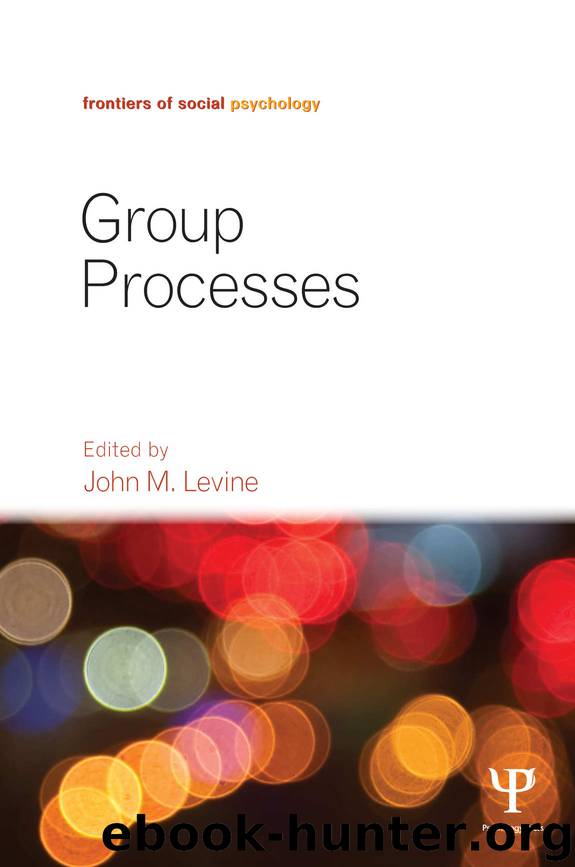Group Processes (Frontiers of Social Psychology) by John M. Levine

Author:John M. Levine
Language: eng
Format: mobi
ISBN: 9781135254254
Publisher: Taylor and Francis
Published: 2012-10-11T14:00:00+00:00
Implications and Future Directions
One of the main implications of this review is that group decision making theory and research is alive and well. Research from various disciplines and vantage points has both clarified traditional findings and helped to develop new theoretical perspectives. One of the most important new perspectives encompasses the return and expansion of motivational concepts in relation to how groups make decisions. Much of the work in the 1980’s and 1990’s revolved around the new paradigm (at the time) of groups as information processors (Hinsz, Tindale, & Vollrath, 1997; Larson & Christensen, 1993). Although this work revolutionized our understanding of how groups actually use and share information when trying to reach consensus, motivational issues remained in the background. However, recent reviews (Wittenbaum, Hollingshead, & Botero, 2004) and new theoretical directions (De Dreu, Nijstad, & van Knippenberg, 2008; Halevy et al., 2008) have brought motivation back to its proper and prominent place for understanding group decision making. In addition, this work has begun to reunite research on negotiation and bargaining with work on more cooperatively oriented groups. Group members who start with different ideas based on different information and who attempt to reach consensus may not be all that dissimilar to groups in which conflicts are more resource than idea based (De Dreu, 2010). Finding that the same set of shared motivations leads to both better integrative solutions and better collective decisions should help to develop new theoretical innovations in both topic areas.
Another overarching theme in this review is that most groups follow some very basic processes when trying to reach consensus. These basic processes are typically well suited to collective endeavors, but in some cases can lead to disastrous results. Thus, we do not need different theories to understand how and when groups do well versus poorly (e.g., Janis, 1982). Although “Groupthink” is now embedded in our cultural milieu and will probably remain with us for the foreseeable future, we hope that group decision researchers will no longer feel the need explain poor group decisions as unnatural or reflecting dysfunctional processes (Baron, 2005). In decision making groups, majorities often win, group members conform to salient group norms, shared knowledge is relied upon, shared perspectives or strategies predominate, and shared motives for protection and enhancement produce ingroup favoritism. Such processes often stem from natural adaptations to group life (Kameda & Tindale, 2006; Brewer & Caporael, 2006) and often serve groups well. However, in our current multicultural and mega-informational environment, some of these processes lead to dysfunctional behaviors and less-than-desirable outcomes.
The notion that poor group decision outcomes can flow from quite natural group processes is not to say that such outcomes are foregone conclusions. We now have a fairly good understanding of how groups process information and how appropriate group composition and process interventions can reduce or prevent decision failures. Brodbeck et al. (2007) outlined important aspects of group process and situational contexts that can lead to thorough vs. biased information processing. We now know that diversity of opinion and
Download
This site does not store any files on its server. We only index and link to content provided by other sites. Please contact the content providers to delete copyright contents if any and email us, we'll remove relevant links or contents immediately.
Rewire Your Anxious Brain by Catherine M. Pittman(18642)
Talking to Strangers by Malcolm Gladwell(13345)
The Art of Thinking Clearly by Rolf Dobelli(10451)
Mindhunter: Inside the FBI's Elite Serial Crime Unit by John E. Douglas & Mark Olshaker(9318)
Becoming Supernatural by Dr. Joe Dispenza(8199)
Change Your Questions, Change Your Life by Marilee Adams(7758)
Nudge - Improving Decisions about Health, Wealth, and Happiness by Thaler Sunstein(7690)
The Road Less Traveled by M. Scott Peck(7593)
The Lost Art of Listening by Michael P. Nichols(7489)
Mastermind: How to Think Like Sherlock Holmes by Maria Konnikova(7320)
Enlightenment Now: The Case for Reason, Science, Humanism, and Progress by Steven Pinker(7306)
Win Bigly by Scott Adams(7183)
The Way of Zen by Alan W. Watts(6600)
Daring Greatly by Brene Brown(6501)
Big Magic: Creative Living Beyond Fear by Elizabeth Gilbert(5754)
Grit by Angela Duckworth(5604)
Ego Is the Enemy by Ryan Holiday(5413)
Men In Love by Nancy Friday(5232)
The Laws of Human Nature by Robert Greene(5171)
